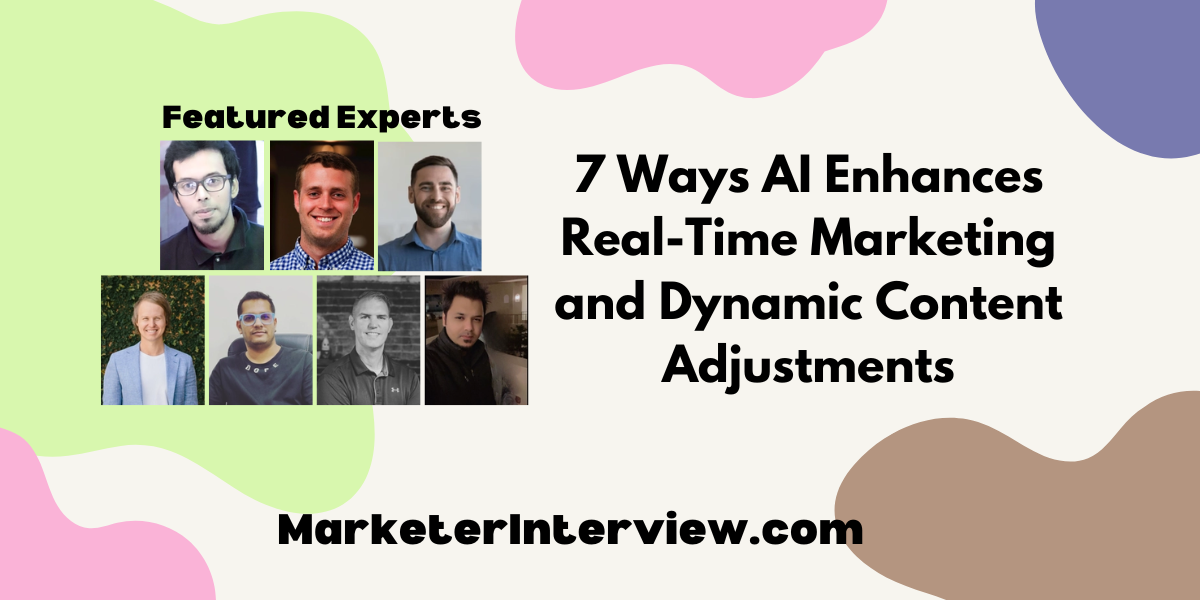7 Ways AI Enhances Real-Time Marketing and Dynamic Content Adjustments
In the fast-paced world of digital marketing, artificial intelligence is revolutionizing how content reaches consumers. From a marketing content strategist’s insights on AI-powered destination wedding marketing to a public relations and content marketing specialist’s take on optimizing ads in real-time, we’ve gathered seven expert opinions, including those from Heads of Marketing, to illuminate the impact of AI on real-time marketing and dynamic content adjustments.
Want to get quoted in MarketerInterview.com content just like this? Apply to become a contributor today!
Contents
AI-Powered Destination Wedding Marketing
Here at Destify, we leverage AI technology for real-time marketing by analyzing data from various sources. Our AI algorithms offer personalized recommendations tailored to customer preferences from personas we’ve created and allow us to better target content writing for SEO optimization.
AI-powered chatbots can provide instant assistance to prospective clients, while sentiment analysis tools ensure timely responses to customer feedback. Through these AI-driven approaches, Destify maintains agility, responsiveness, and competitiveness in the dynamic landscape of destination weddings.

Garrett Nutgrass, Marketing Content Strategist, Destify
Netflix’s Personalized Content Suggestions
Artificial Intelligence (AI) has revolutionized the way marketing is done in today’s digital age. With the power of data analysis and predictive algorithms, AI has become a valuable tool for businesses to make real-time marketing decisions. By analyzing customer behavior and preferences, AI can anticipate their needs and personalize content in real time, resulting in higher engagement and conversion rates.
A great example of AI’s impact on real-time marketing is Netflix’s recommendation engine. By gathering user data such as viewing history, ratings, and search queries, AI algorithms create personalized content suggestions for each individual in real time. This allows Netflix to continuously adjust its content offerings to match the interests and preferences of its users, resulting in a highly engaging and satisfying viewing experience. This has not only increased customer retention but also helped Netflix attract new subscribers through word-of-mouth recommendations.

Fred Hoffman, Head of Marketing, Kind House Buyers
Sentiment Analysis for Agile Marketing
As a Marketing Head, one lesser-known insight into how AI contributes to real-time marketing and dynamic content adjustments is through AI-powered sentiment analysis. AI algorithms can analyze social media conversations, customer reviews, and other online interactions in real time to gauge the sentiment of customers towards our brand, products, and marketing campaigns.
By leveraging sentiment analysis, we can quickly identify shifts in customer sentiment and adjust our marketing strategies accordingly. For example, if sentiment analysis reveals that a particular marketing campaign is receiving negative feedback from customers, we can immediately pivot and make necessary adjustments to address their concerns or alter our messaging to better resonate with our audience.
Furthermore, sentiment analysis can help us identify emerging trends, sentiments, and conversations within our target audience, allowing us to capitalize on opportunities or address potential issues before they escalate. This real-time insight into customer sentiment enables us to stay agile and responsive in our marketing efforts, ultimately leading to more effective campaigns and enhanced customer satisfaction.

Alex Taylor, Head of Marketing, CrownTV
AI-Driven Instant Content Adaptation
AI transforms real-time marketing by analyzing vast data streams instantly. It’s about delivering the right message exactly when it counts. With AI, we’re seeing content that adapts on the fly—to weather, stock levels, user behavior. That’s powerful and persuasive.
Here’s a tangible example: An online retailer’s AI system tracks a sudden cold snap. Instantly, it adjusts the website, prioritizing winter wear and suggesting products based on user location and past purchases. Customers see exactly what they need, the moment they need it.
This is beyond traditional marketing. It’s like having a thousand digital marketers in one algorithm, all working in perfect unison. The impact is huge: better engagement, increased sales, and a customer experience that feels almost telepathic.

Casey Jones, Founder, Head of Marketing, CJ&CO
E-Commerce Personalized User Experiences
AI is revolutionizing real-time marketing and dynamic content adjustments by enabling marketers to analyze vast amounts of data quickly, predict consumer behavior, and deliver personalized content at just the right moment. For example, AI-powered tools can track a user’s online behavior and preferences in real time, allowing for the automatic customization of website content, ads, or email marketing messages to match the individual’s interests.
A practical instance of this is an e-commerce website that uses AI to show visitors personalized product recommendations based on their browsing history, previous purchases, and what other similar users have liked. This approach not only enhances the user experience by making it more relevant and engaging but also significantly increases the chances of conversion by presenting the most pertinent offers and content to each user. It’s like having a smart assistant that knows exactly what your customers want, even before they do!

Bhavik Sarkhedi, Growth Head & CMO, Content Whale
Spotify’s AI-Curated Discover Weekly
Artificial Intelligence (AI) has been a game-changer for many industries, including marketing. It enables businesses to analyze vast amounts of data in real time and make informed decisions that can improve their marketing strategies. With the help of AI, marketers can now track customer behavior, preferences, and trends instantly and adjust their content accordingly. This real-time approach to marketing allows businesses to stay ahead of the competition and create personalized and relevant content for their target audience.
An excellent example of how AI contributes to real-time marketing and dynamic content adjustments is Spotify’s Discover Weekly feature. With over 345 million active users, Spotify leverages AI algorithms to analyze listeners’ music preferences in real time and create customized playlists for each user every week.
By doing so, Spotify keeps its users engaged and satisfied by providing them with personalized content based on their listening habits. This AI-driven approach has proven to be hugely successful for Spotify, increasing user retention and overall satisfaction.

Brian Hemmerle, Founder & CEO, Kentucky Sell Now
Optimizing Ads with AI in Real-Time
We regularly use AI algorithms to improve our ad performances. There are various steps to this. For instance, if we have to run a Facebook ad campaign for a new and trendy product, AI tools can monitor the ad performance in real-time to identify the target demographic. If the product appeals most to women aged 25-35, we will adjust our targeting parameters to reach this segment.
At the same time, we will change our ad copy, images, and CTA lines to better speak to this audience. Moreover, if AI insights show that certain periods bring higher engagement, we can adjust the ad delivery schedule accordingly. Lastly, these tools can constantly test and optimize the different elements of our ad campaign to get the best results and returns on our marketing investment. It’s quite unlike any strategy, as the span between generating content and getting feedback has reduced dramatically!

Faizan Khan, Public Relations and Content Marketing Specialist, Ubuy UK
Want to get quoted in MarketerInterview.com content just like this? Apply to become a contributor today!






